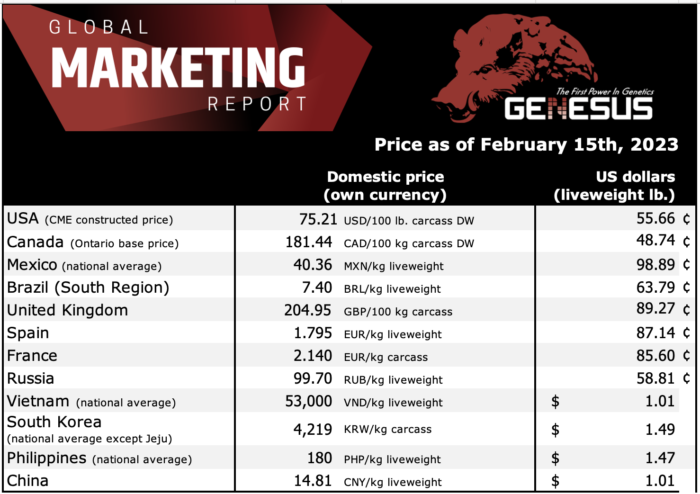Spencer Long of Genesus

Challenges remain in the Canadian pork industry with high input costs that are impacting profitability for producers. Pork exports to the US remain high and the need for US packers to fill voids in capacity. Olymel, a large Canadian packer based in Quebec announced they will be reducing the purchase of hogs by 855,000 beginning June 3rd. This will continue the flow of more hogs from Canada to the U.S. that need to be harvested.
I had the opportunity to attend the Banff Swine Seminar in January in Banff, Alberta. It was a very well-attended conference with 783 attendees of producers and industry people. Last year there were just over 200 attendees due to the pandemic, this was a massive rebound in attendance. The mood at the conference despite the ongoing challenges with profitability was positive. The speakers in general were good and gave their perspective on what’s going on in the marketplace.
One of the speakers at the conference was a representative from the world’s largest swine genetic company and spoke about “sustainability” and “gene-editing”. Sustainability is a buzzword that is increasingly being used by many in our industry as more consumers are becoming more conscious. Gene-editing on the other hand is a word that many consumers do not like or want to consume the food. In this presentation by the world’s largest genetic company, they spoke of their 60-year legacy in our industry. There is no doubt they are the biggest in the world and have been around for a long time, this is no small feat. Within this legacy the presenter didn’t mention the sustainability of staggering mortality and sow prolapses they are facing currently; he also didn’t mention if gene-editing could fix these massive problems.
Another thing that was not mentioned in his hour-long commercial on the legacy of the world’s largest swine genetic company was taste. Not once was the word taste used; it must not be in their vernacular or even considered. That at the end of the day is far more important and will create real sustainability for our industry. Every consumer study says taste is the #1 factor in whether they like a product or not and influences whether they buy it. At the end of the day, it is totally baffling why we have allowed inferior pork to become the norm in the marketplace, that isn’t sustainable. When the world’s largest swine genetic company isn’t even talking about or seemingly working on producing Pork that tastes good our industry will continue to spin its tires wondering why demand has remained stagnant for decades while other meat demand has gone up.
This also plays into the gene-editing push they are doing. Gene-editing against PRRS has been something they have been working on for years now and have more than likely poured gobbles of money into. At Genesus we have decided not to dive headfirst into gene-editing not because we are against science but because of consumer acceptance. An Iowa State survey showed 60% of women would be unwilling to eat and purposely avoid gene-edited foods; that isn’t exactly sustainable for our industry. In another study, it was found 75% of the American public agree there should be a federal labeling law for gene-edited foods, regardless of whether or not they plan on buying or avoiding them.
Gene-editing and GMOs go together, why would packers, brands, and retailers want to potentially destroy sales if gene-edited Pork must be labeled as such? If we look at GMO Salmon for example 9 of the 10 largest grocery chains in the U.S. have pledged, they will not sell GMO Salmon including Walmart, Costco, Kroger, Hy-Vee, Meijer, Aldi, Target, etc. Why would they then turn around and want to sell gene-edited Pork? They obviously see an issue with GMO Salmon, and I really doubt they want to be the ones having to explain how gene-editing is supposedly different to consumers. The whole gene-editing push is just noise if the Pork doesn’t taste good. A Washington State University-led survey of U.S. consumers showed that despite hesitation about gene-edited foods, taste trumps everything. It all goes back to taste and the sooner our industry fully grasps that the sooner we will become more sustainable and not potentially destroy consumption with gene-edited Pork.
At Genesus we have worked for 25 years on producing better-tasting Pork at a competitive cost of production. We have won countless taste tests to back our claim with our Jersey Red Duroc as the Ultimate Tasting Pork. We believe fundamentally that taste is what will make our industry sustainable. When the world’s largest swine genetic company is part of a publicly traded organization and one of their biggest shareholders is BlackRock, an investment company that has made a goal for net zero greenhouse gas emissions, it makes you wonder who’s really calling the shots and if they are thinking about what’s best for our industry.
Sources:
https://www.blackrock.com/corporate/sustainability/committed-to-sustainability
https://www.lebulletin.com/elevage/reduction-achat-porcs-olymel-125087
https://www.news.iastate.edu/news/2022/06/28/gene-editing-foods
https://www.taste-institute.com/en/resources/blog/importance-of-taste-in-product-development
Categorised in: Featured News, Global Markets
This post was written by Genesus



